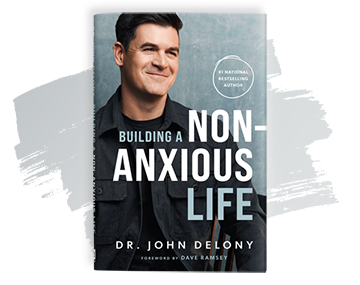
Sometimes, life feels like a never-ending to-do list. We rush to our busy jobs every morning only to rush back to our homes, which often look like disaster zones—especially if you have kids. (Lego minefield, anyone?) Balancing health and work and friendships and errands can make you feel like you’re running on a treadmill you can’t turn off.
Sound familiar? Unfortunately, feeling overwhelmed has become the new normal. Just chalk it up to overbooked schedules, competing commitments and a Instagram-perfect standard of life.
Nobody wants to live each day feeling like they’re running on a treadmill. But the black hole of things you need to do quickly zaps the energy, productivity and joy out of your life. So, when you start to feel completely overwhelmed by it all, here are some things you can do to take back control.
Why Do I Feel So Overwhelmed?
If you’re feeling overwhelmed, the culprit may be one (or more) of these things:
1. You’re doing too many things.
Doing too many things quickly leads to burnout because we often cram way too much into our schedules without giving ourselves any breathing room or time to rest.
2. You’re doing the wrong things.
Doing the wrong things is a more subtle problem. Sure, you might not be super busy, but the commitments you do have drain you—like being stuck in a toxic job. You feel anxious and stressed because you don’t enjoy what you are doing.
3. You’re in a busy season.
Feeling overwhelmed could also be the natural result of being in a busy season—like planning a wedding, taking more responsibility at work, or having a baby.
Get expert money advice to reach your money goals faster!
No matter the root cause, the problem is the same: You feel overwhelmed when you don’t have the mental, emotional or physical capacity to accomplish everything you’re trying to do.
How to Deal With Feeling Overwhelmed
When the panic of feeling overwhelmed starts to bubble up, you have a choice in how you respond. Here are 12 ways to respond that will help you move forward and not stay stuck.
1. Recognize the season you’re in.
During busy seasons of your life—like starting college, planning a wedding, buying a house, starting a business, or having a baby—it’s totally normal to feel overwhelmed for a while.
And sometimes, even the regular, run-of-the-mill routines can pile up without your noticing it. When this happens, you need to remember: You can’t do it all. And that’s okay—you’re human.
Separate yourself from your season. Just because you’re in a mess doesn’t mean you are a mess. For example, if you’re busy two weeks in a row and don’t have time to clean your car, all those bagel crumbs and empty Starbucks cups (and that one random water bottle rolling around in the back) can pile up and make you feel like a slob who’s losing at life. But two weeks aren’t your whole life and don’t last forever. In a few more weeks, you may get time and have a car so clean you’ll want to take Instagram it.
Basing your value on a snapshot of how you’re doing in any given moment isn’t a real picture of the truth. You’re more than just two weeks of trashing the passenger seat!
Instead of piling on the guilt, learn how to make the most of this season. It won’t last forever.
2. Focus on what you’re doing right.
It’s easy to start your day thinking of everything you didn’t do the day before, but that only leads to discouragement. So, do the opposite. Think about what you did accomplish yesterday, and feel proud about it. You can’t do it all, but you can do a lot. When you spend time remembering what you’ve already done, you’ll be in a completely different headspace for the upcoming tasks.
3. Write things down.
Everything feels more intimidating when you don’t know exactly what you’re facing. If you’re overwhelmed by everything you have to do, get your thoughts out of your head and onto paper. It could be as simple as jotting down a quick to-do list or as in-depth as journaling your thoughts before bed.
David Allen, a productivity expert, says, “Your mind is for having ideas, not holding them.” When you put your ideas somewhere else, it reduces the nagging feeling that something’s escaping you and can lower your stress.
4. Keep two separate to-do lists.
As you write things down, keep two separate lists. The first list should be things you want to get done soon—as in today or this week. The second list is for things you can do if and when there’s time left over. Working with two different lists means you’re telling yourself it’s okay if you don’t get to some of those tasks.
5. Control what you can control.
Spend some time thinking about the specific things that are stressing you out. In any given situation, there are things you can control and things you can’t. Identifying what you can control and actively letting go of what you can’t is one of the best ways to deal with anxiety.
For example, let’s say you’re swamped in your small business or side gig right now. What can you control in that scenario? Maybe you can decide to say no to a few clients or you can hire some seasonal help.
Maybe you're doing the wrong thing—like that job you hate, which is adding stress to your life. You can’t change your boss, but you can change who your boss is. Start looking for a job you love. Sometimes, the simple act of doing something about it—even if it doesn’t fix the problem immediately—helps.
Want to Build a Non-Anxious Life?
For guidance on making the daily choices that will help you be well, check out Dr. John Delony’s new book.
6. Put systems in place.
We all operate by systems. Author and pastor Craig Groeschel defines systems as how you accomplish the what (how you fill the dishwasher is even a system!). Since we use them all the time, it pays to make sure they’re good ones. Groeschel puts it this way: “You either have systems by intent or by default.”
Sometimes, a good system is simpler than you’d think. One of the easiest systems for wrangling a family schedule is a calendar! If your family is having trouble staying on the same page, buy a cheap magnetic calendar and slap that baby on the fridge (or if everybody has a phone, you can make a shared calendar on Google). Write down everybody’s plans on that calendar. Then you’ll never have to deal with that Saturday where one of you drives off to golf while the other is coordinating outfits for family photos in an hour. Yeah.
Try out a few system-based approaches that can help solve the problems you’re facing and see what works for you and your family.
7. Rework your schedule.
If you’re consistently feeling overwhelmed, you need to make some major changes to how you manage your time. It’s time to revisit your priorities and create a schedule that reflects what’s most important to you. Figure out what you enjoy doing, what’s most important to you, and what commitments leave you feeling drained and stressed out that you can cut.
8. Learn to say no.
For most people, saying no and standing their ground is incredibly hard. Everybody wants to be liked and—probably even more so—wants to be needed. Chasing validation can end up loading your plate with too many commitments. But the good news is, there’s a way for you to be kind and loving and still be honest and firm at the same time. You can learn how to say no.
If you don’t have boundaries, you leave yourself open to being pushed around by life (and people!). You’ll agree to commitments that you end up resenting and regretting later. You’ll take on yet another big project at work. You’ll volunteer to coach your son’s soccer team of 4-year-olds even though your wife is seven months pregnant and you have a looming deadline at work because, well, they didn’t have anyone else. You’ll become a person you don’t like in a life you don’t like.
Just say no.
9. Do something you enjoy.
If the term “self-care” makes you want to throw up in your mouth a little, you’re not alone. But feeling overwhelmed will quickly snuff out your spark for life.
You don’t have to start a YouTube channel chronicling your self-care journey (please don’t), but you should make time for things that refill your tank and add a little fun to your life. Take a break and do something that brings you joy. Read your Bible or a good book to put some positive thoughts in your mind. Grab dinner with a good friend you haven’t seen in a while. Plan a scavenger hunt for your kids.
It's easy to get stuck in problem-solving mode. But when you choose to turn that part of your brain off and inject some joy into your life instead, you create breathing room—the mental space to be a better problem-solver later.
This may seem too simple, but when you choose to have fun, it brings lightness to your life when you need it the most. It takes your focus off the overwhelming things going on and instead puts it on the beautiful things right in front of you—like having a cup of coffee with someone you love or experiencing a golden-hour sunset in your backyard.
10. Make sleep a priority.
Remember the last time you got a really good night’s sleep? In the morning, you felt like you could tackle anything! (If you can’t remember, just trust us—that’s what it feels like.)
Make rest a priority. Seeing things clearly when you’re exhausted is a challenge. It’s hard to even think about organizing the garage on five hours of sleep. But an extra two or three hours of Z’s can give you the energy and focus to maximize the hours in your day and knock out your to-do list. You wake up with a fresh perspective on your life and fresh enthusiasm to do what’s in front of you.
11. Exercise.
When you’re overwhelmed, it’s easy to put exercise on the back burner. You’re already exhausted without throwing HIIT into the mix, right? But moving that body can help you feel less stressed, more in control, and more powerful. So get off your butt. Go for a run. Do some jumping jacks and get those endorphins flowing.
12. Pray.
You may not be a person of faith. Meditation might be your jam. But we’re here for prayer. Praying when you feel anxious will will bring peace and calm in a way nothing else will. God isn’t a distant being in heaven pointing an angry finger at you. He’s personal. He knows your needs, and He cares about them. He already knows what’s making you feel overwhelmed. He loves it when you come to Him with your fears, gratitude and desires.
Take Back Your Time
It sucks to feel like a hamster running on a wheel—just doing your best to keep up. One of the core problems with feeling overwhelmed is that we’ve got so many tasks and what feels like so little time. But there are ways to get back in control of your time so you can spend it on what matters most to you.
Our Goal Tracker Worksheet can help you get your relational and spiritual priorities in line with the time you have and organize your life to see where you may be overcommitted and where you can schedule some fun time! It’ll also help you get your goals in writing. Seeing your goals in black and white will help you hold yourself accountable and track your progress along the way.



